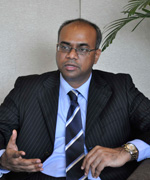Global HR firm Randstad to recognise Sri Lanka’s most attractive employers

Brian Wilkinson
A global Human Resource (HR) firm, Randstad plans to recognize Sri Lanka’s most attractive employers based on the results of an independent employer branding survey, a top official of the company said. Ranstad, the world’s second largest HR firm has been in Sri Lanka since 2004.
The awards will be presented to most attractive employers selected by conducting a 3-month employer branding research. The awards ceremony will be held in Colombo next year, Brian Wilkinson Executive Board Member and Chairman for Ranstad, India told the Business Times in an interview.
It is part of the company’s strategy to be in areas other than regular permanent staffing. India and Sri Lanka contribute 20% of business volumes for Randstad globally, he added. “What makes the awards special, and differentiates it from others, is that organisations cannot nominate themselves or determine categories or criteria for entry.

E. Balaji
The winner is selected by an independent expert panel making it the people’s choice award for the most attractive and excellent employer,” Mr Wilkinson said. The winner of the Randstad Award is based on how appealing the selected company is, as a potential employer to the respondents. The companies are also evaluated on 10 factors determining the perception of the employer brand. The 10 factors are financial health, Good training opportunities, long-term job security, opportunities for career advancement, strong management, interesting job content, a pleasant and stimulating working environment, competitive salaries and employee benefits, a good work-life balance and progressive policies concerning the environment and society (CSR), he disclosed.
Mr.Wilkinson expressed optimism on Sri Lanka’s future economic prospects with the expansion of tourism, telecommunication, IT and health sectors creating more employment opportunities. He went on to say that the ageing workforce need to be addressed across the globe, as countries where there is a lack of skills coming through, such as Sri Lanka, could end up suffering a loss of a skilled workforce. Such a problem is also in evident in many countries, where it was reported that several small companies starting out fail to find people who have the adequate skills, with most of them saying that they felt the right talents were not available amongst youngsters, he added. Randstad’s HR business in Sri Lanka has been steadily growing since its presence here in Colombo since 2008.
The company’s revenue increased by 250 per cent year on year and it has catered to the HR needs of 200 companies including banks and telecommunication providers as well as top blue chip firms. Every month, five to six Sri Lankan companies seek the assistance of Randstad for staffing, consulting and executive headhunting. Regarding Randstad’s future plans for the Sri Lankan market, he said the company has “big (business) opportunity” and would look at increasing its market share.
E. Balaji, Managing Director and CEO of Randstad India Ltd said despite the economic downturn across the world since 2008, there are structural changes and global trends which continue over a number of years and still exist, regardless of economic trends.
Randstad has commissioned new research into the ways in which the demand for staff in certain sectors develops as a constant no matter how the economy is performing, he added.
He said that another issue many of Randstad’s clients were now looking at was the employment of people especially professionals from other countries, which was now becoming more prominent. “We see discrepancies between the educational choices people make and the needs of the labour market, influenced by globalization and technological developments. Some traditional industries like agriculture or manufacturing continue to diminish and will have less jobs available.
But people working in these industries will not immediately have the right set of skills to be able to work in emerging sectors such as IT and healthcare. Re-skilling will be needed, “he said.
comments powered by Disqus





















